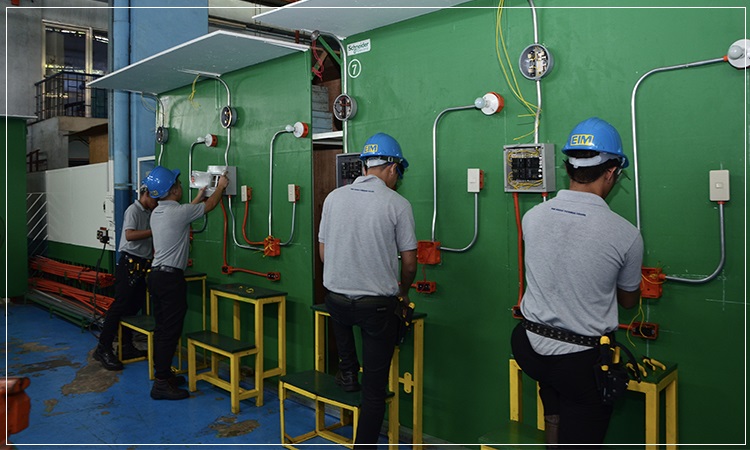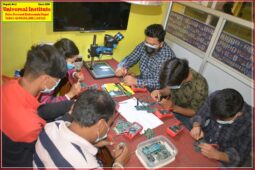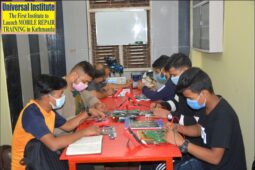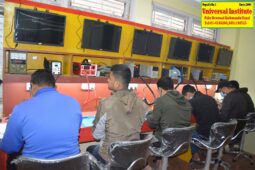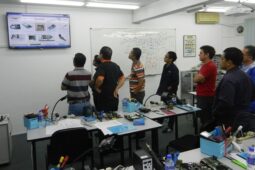House Wiring | Building Electrician Training in Kathmandu
Universal Electronics Institute offers one year training program for those basic to diploma, who want to be get in the profession of Electrician. We provide the complete training on Electrician & after completion of training is awarded to candidates. We also provide the advance facility into the different companies for those students who complete the training successfully. We are one of the leading Electrician training institutes in Kathmandu,Nepal.
The House Wiring | Building Electrician course is designed to prepare the participant to find entry-level jobs in the electrical trades. It includes both theoretical and hands-on work training and aims to provide the required knowledge on building basic electrical circuits, building consumer units, fabrication techniques, cable types and equipment identification, hand tools familiarization, electrical formulas, inspection and testing, health and safety principles and rules. Electricians install and maintain all of the electrical and power systems for our homes, businesses and factories. They install and maintain the wiring and control equipment through which electricity flows. Electricians generally focus on either construction or maintenance, although many do both.
Entry Criteria
Individuals who meet the following criteria will be allowed to enter this training program:
- Minimum of Eight class pass or equivalent
- Minimum of 18 years of age
- No previous professional training.
- Able to read general text.
- Physically and mentally fit to do professional work.
Trainers’ Qualification (Minimum)
- Diploma in electrical engineering or equivalent in related field.
- Good communicative and instructional skills.
- Experience in related field.
An Electrician generally works in the field of mechanical and electrical (M & E) systems engineering and energy which includes the installation, maintenance or repair of electrical equipment and a variety of electrical circuits.
An Electrician
After completion of training the trainees will be able to:
- knows how to work with low voltage electrical installations,
- understands the entire work process and the standards required,
- works carefully and responsibly as a recognized electrician and he advises customers on the benefits and costs of electrical installations.
- Develop professionalism associated with the building electrician trade; Maintain Safety;
- Interpret Drawings and Layout Electrical Wiring;
- Maintain Tools & Equipment;
- Install Wiring;
- Perform Installations and Assembling of Electrical Appliance / items;
- Install Electrical Appliances / Items / Solar Panels;
- Perform Distribution of Electrical Supply;
- Perform Preventive and Corrective Maintenance;
- Perform Quality Checks; and Maintain Documentation.
Skill Testing
The graduates who have completion certificate of “Electrician” may sit in the skill testing examination of provisioned and administered by the National Skill Testing Board. If you want to certify your skill through a skill test, then following are the requirement to take a skill test exam:
- Nepalese citizenship
- Passport size 4 pieces and Auto size 1 piece photo
- Must be above 18 years
- You must have successfully completed 140 hours training in relevant occupation/trade.
The Council for Technical Education and Vocational Training (CTEVT) is based on training and learning at the vocational school, the training company and the practical training center (PTC). PTC provides basic practical knowledge in all areas of the profession and shows how theory can be put into practice. Students will get a certificate as CTEVT certified Electrician when they pass the final exam.
Job Placements
The pass out of this course would be able to:
- Work in small & big construction units as building electrician
- Work as building electrician in an electrical outfit/company/ organization
- Work as building electrician with construction contractor
- Be self employed by having his own electrical/wiring workshop
- Work in Electrician assistant
- Work in Assistant electrical inspector
- Work in Assistant superintendent
- Project manager electrical assistant
- Work in house wiring helper
Course Introduction
- Basic Electricity
- Matter, Electron flow and Electric current
- Conductors, Resistors & Insulators
- AC and DC Principles
- Electrical Terms and Definition, Ohm’s Law
- Electrical Circuit – Series circuit, Parallel circuit and Series-Parallel circuit
- Relationships between voltage, ohms, amperes, three-phase voltage, current and power
- 1-phase and 3-phase power, Star and Delta connections and calculation of values
- Transmission Overview &Transmission equipments
- Major equipment (Transformers, circuit breakers, regulators, air switches)
- Understanding Electrical Symbols and Single Line Diagram
- Equipment identification, Trouble shooting and fault finding.
- Cables and Wiring
- Electrical Measuring Devices and Testing
- Electrical Distribution
- Working with Electrical panels
- Wiring of panels practical, PLC controlled automation model & motor starters.
- Importance of earthing, Types of earthing, Earthing grids in industry
Click below to watch the ac fridge training video.
House Wiring Training in Kathmandu,Nepal
House wiring is responsible for setting up, wiring and repairing electrical building systems, like in homes and commercial buildings. There are some electrician courses available, as well as other learning materials about topics related to electrical work, that may be interesting for current house electricians or those considering electrician careers. Some of these are courses through online learning platforms, institute or other organizations. There are also written resources available. However, it is important to note that these free courses aren’t enough to become an House wiring electrician. To become a journeyman electrician, one generally needs to complete apprenticeships and get licensed in their state; some also attend a trade institute.
Electrician technology is very important & essential throughout the world. Electricians play a critical role in building development and maintenance. They install and maintain electrical power systems, communication tools, and wiring in residences and businesses. While electrician is generally regarded as an admirable occupation, you have to weigh the pay and benefits against the dangerous attributes of the work.Electricians are responsible for testing, fitting and repairing wiring and circuits and installing new electrical infrastructures. An electrician is a tradesman responsible for the maintenance and installation of electrical wiring and related equipment. Electricians usually work in residential homes, public buildings or offices, ensuring that wires and circuits are safe, repairing faults in the electrics and installing new circuits after building work is complete. In this technology these also three steps, which are most important, They are :
1.House Electrician:
It is very essential for this house hold purpose. Without house electrician not a single domestic work can be performed. Today each and every work is related with the electrical power, which is performed by the house electrician. But house electrician that must be trained and knowledgeable, so that they can do all important and essential work related with electricity.
2.Plant/Industrial Electrician:
The trained and well known technician, knowing all about the electrical work either in Industries or small and big factories, such type of electrician should be so trained, who can solve the problem just after finally the fault in the system. They should e capable to attend the different types of role like- Auto, Semi auto, CNC, even electronics related jobs and computerized role , can be attended and rectifier the deflects.
3.Electrical Instrument Engineering:
This is the important part of the electrical technology. Each and every electrical parameter are controlled by the Instrument Technician. Any depict problem in the instrument line testing, repairing, calibrating and rectifying the faults is the important roll of the technician. Such type of trainee is give in our institute, leave all types of facilities, which is thought by the trained or knowledgeable persons.
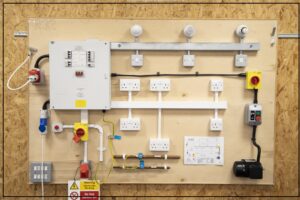
Electrician Training in Kathmandu Nepal
Electrician courses are a field of electric studies that cover the basics of electrician work including wiring, knowledge of household appliances, solar power, invertor power, ups power, electrical circuits, breakers, etc. These courses are usually offered as Basic and Diploma courses.
This curricular program is based on the job required to be performed by a Electrician. Therefore, this curriculum is designed to equip trainees with the skills and knowledge on Basic House Wiring. This course intends to provide skills and knowledge on house wiring works related to the occupation. This course deals with concept of wiring, electrical instruments and their application, various calculations, electrical drawing interpretation, symbol identification, design and installation of various pattern of wiring system, repair and replacement of damaged wiring components and installation and connection of earthling electrode.
We Break down three levels of Building Electrician Training:
1.Building Electrician Level 1
2.Building Electrician Level 2
3.Building Electrician Level 3
After completing Electrician courses, the job profiles open to a candidate are Electrician, Electrical Manager, Maintenance Manager, Professor, Electrical Engineer, etc. The average starting salary for program levels is between NRS 4,00,000 and 10,00,000 per annum.
After completion of training the trainees will be able to:
- State the concept of electricity.
- Apply electrical instruments for measuring resistance, voltage, current & power.
- Identify and interpret electrical symbols and codes.
- Install and connect accessories, fittings, protective devices and distribution board
- Install various pattern of wiring system.
- Install and connect earthing electrode.
- Repair and replace components of damaged wiring system.
- Carryout a complete wiring system.
- Be familiar with occupational health and apply safe working technique.
- Apply Communication and Small Enterprise Development skills.
Tools and Equipment( For Building Electrician Course)
- Side cutting pliers Bench vise Measuring tape
- Nipper Metal cutting saw Saw
- Needle nose pliers, straight High speed grinding wheel
- Screwdrivers sets, electricians Prick knife Chisel, wood
- Electricians knives Fish tape (for pulling wires) Plumb line
- Pliers, combinations Drive-it gun Safety belt
- Water pump pliers Center punch Punner (punning rod)
- Wrenches
- Socket wrench
- Adjustable wrench
- Pipe wrench
- Drills
- Spanners
- Hole saw Pick
- Crimping tools Wood-boring bit Puller
- Soldering iron Pit screw anger Ladders
- Bolt clipper Brace Folding rule
- Cable cutter and Stripper
- Pipe vise Die and die stock Wire gauge
- Ammeter, Ohmmeter, Wattmeter, Multimeter
Industrial Electrician Training program
Are you thinking of working as an Industrial Electrician (IE)? To be successful, you’ll need to complete industrial electrician training from one of the Universal institutes. They will provide you with the professional knowledge and advanced skills you’ll need. The Industrial electrician course is designed to provide related training in the electrical trade that will give students the proper coursework in Safety, Electrical Code, Equipment and knowledge of the trade.
Industrial Electrician means a person who inspects, installs, tests, troubleshoots, repairs, and services industrial electrical equipment and associated electrical and electronic controls. Service includes calibration and preventative/predictive maintenance. Industrial Electricians are employed by maintenance departments of plants, mines, smelters, oil and gas rigs as well as platforms, mills, shipyards, factories and other industrial establishments. Some are employed by electrical contractors.
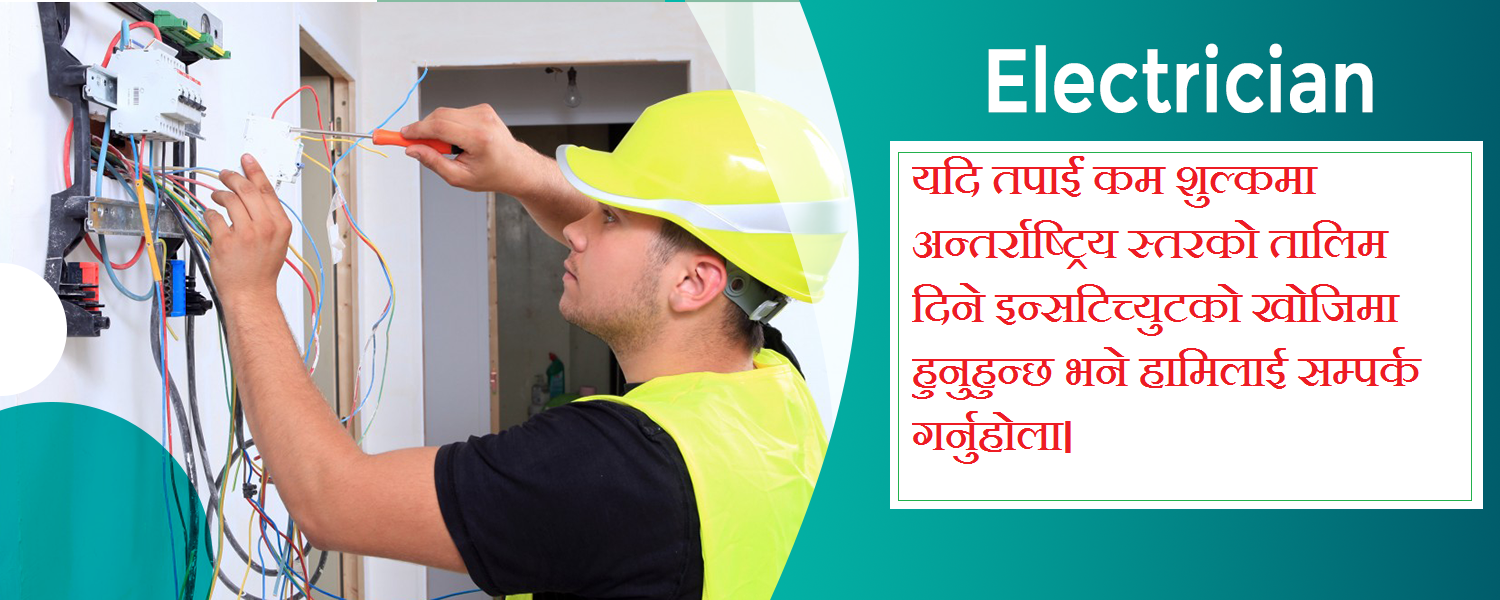
Industrial electricians work with a wide range of electrical companies, parts manufacturers, and steel producers. They can work as an independent contractor or for one employer full-time. Industrial electricians may work in a small group with other industrial electricians or work independently. They work under the supervision of a shift supervisor or a plant manager. Electrical contractors and maintenance departments of factories, plants, mines, shipyards, and other manufacturing establishments also employ industrial electricians.
We focus on teaching & fine tuning the practical skills of the students to help them gain employment.
- Get trained at CTEVT (Govt. Nepal) training centre
- Faculty with 24+ years experience in similar field
- Latest tools, equipments & machines
- International quality workshop
Why Choose us for Electrical Technician Training ?
Our extensive team of expert instructors and training professionals has established a leading electrical technician training institute in the NEPAL. With flexible sessions and easily understandable lessons on home electrical(house wiring) services or industrial electrician, we help you advance your knowledge and increase your scope of employ ability.
Bulding Electrician courses: FAQs
Ques. What is the duration of a Building Electrician course?
Ans. The certificate courses have a duration ranging from a 1.5 months to 6 months, while the level-1,level and advanced level-3 courses have a duration of 3 to 6 months.
Ques. How much does it cost to do a Building Electrician course?
Electrician course fee depending upon the type of course, these courses can be pursued by students who have passed minimum 8th class. In cases of many training programs, you don’t even need to satisfy minimum educational qualification criteria.This training program can help you get a job quickly. The training will also enable you to become self-employed. In Electrician training programs are job oriented in nature. If you are looking for a short-term course that will help you get a job, this training program will be of help to you. please note that most of the Electrician course will help you get entry level jobs.
1. Building Electrician Course Level-1/2 Duration:45 days Course Fee, Nrs:17000/-
Ques. What is the average salary after completing a Building Electrician course?
Ans. The salary depends upon various factors such as level of education, employer, and even the city. However, the average monthly salary after completion of a certificate course is NRs 15,000-50,000 per month after level 3 courses. The average salary for freshers and starters is between NRs 15,000 and NRs 25,000 per month, and it gradually increases with experience. The average monthly salary for experienced technicians ranges from NRs 40,000 to NRs 50,000.
Ques. What is the scope of Building electrician?
Ans. Here is a lot of scope n your career if you do Electrician course . The electrician can work in both Government and Private sectors.Your career progression path starts at Helper Electrician, then you become assistant electrician, electrician, work supervisor, construction site engineer and finally Project manager.
Place of Training: Universal Electronics Institute, pako new road kathmandu.
Contact Person: Kiran Tiwari
Contact No: 9851198723,01-5346260
Duration of course: 45 Days
Medium of instruction: Nepali,Hindi and English
Group structure: 6 participants per group
New classes are started from 01st, 10th and 20th of every month.
Once the course date is confirmed, you just need to book the hotel and buy the bus or air ticket. Once you have reached the Kathmandu bus park or airport, you can take hostel/hotel and the next day you can come over to our premises and take the course. I suggest that you book the hostel because it is just a walking distance to our premises.
If you prefer to take a bus from the bus park to New road then you need to take a city micro bus. The distance between bus park and new road is less than 5 km and cost less than NRs 25. If you can take a taxi from bus park, taxi fares cost about NRs 250 to NRs 350/- only.
Note: You can place an online booking to reserve a seat.If you have other question please Contact us: Mobile/Viber/Whats app 9851198723
Related Posts:
- Mobile Repair (Advance Chip Level)
- Computer/Laptop repair (Advance Chip Level)
- Advance Mobile Software (Full)
- TV(LCD/LED/Smart) Repair Course
- Basic Electronics & PWR Supply Course 45 days
- eMMC/UFS/Nand Training 30 days
- AC & Fridge Repair Training 60 days
- Washing Machine Repair Course-30 days
- Building Electricians(House wiring) 45 days
- CCTV Camera Opearting & Installation 45 days
- Home Appliances Repair Training 45 days
- Printer Repair (Dot-Matrix, Ink-Jak, Laser)
- Hobby Electronics Projects 45 days
- Drone Assembling Course 15 days
- Laptop Repair (Basic Card Level-1)
